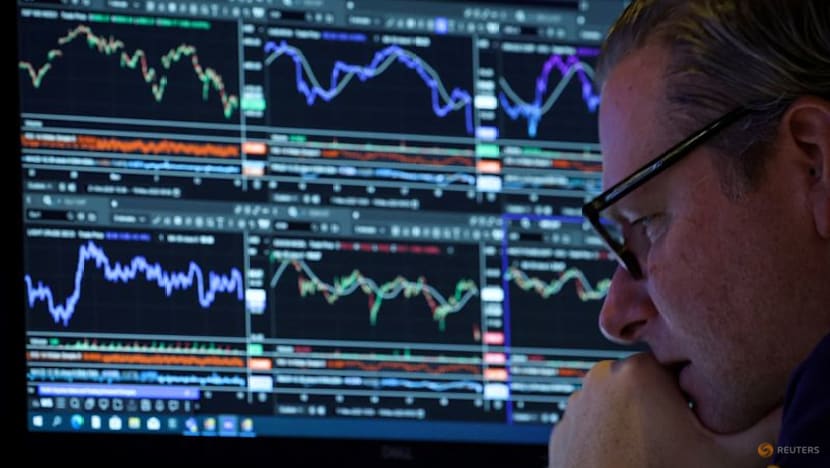Wall Street indexes end lower after sharp reversal, tech leads drop

A specialist trader works inside a booth on the floor at the New York Stock Exchange (NYSE) in New York City, U.S., November 19, 2025. REUTERS/Brendan McDermid
Wall Street stocks slid on Thursday (Nov 20) in a sharp reversal from an early rally, as technology gains faded after a boost from Nvidia's earnings and US jobs data muddied the labour market outlook.
The Nasdaq registered its lowest close since Sep 11, while the S&P 500 had its lowest close since Sep 10. Meanwhile, Wall Street's fear gauge, the Cboe Volatility index, posted its highest close since Apr 24.
Shares of Nvidia ended 3.2 per cent lower after surging as much as 5 per cent earlier in the day. Most chip-related companies were also negative, with an index of semiconductors falling 4.8 per cent.
Both the Nasdaq and Dow swung more than 1,000 points from their highs of the day to their lows. The Nasdaq's 4.9-percentage-point difference between the day's peak and low marked its biggest intraday swing since Apr 9, during the tariff mayhem.
Investors have worried about lofty technology valuations amid concerns over steep artificial intelligence spending, with the Nasdaq now sharply off its October high.
In addition, data showed the US unemployment rate rose in September even as employers added more jobs than economists had expected. That has led to more uncertainty over whether the Federal Reserve will cut interest rates again in December.
"I expected the market to be up today just based on the strength of Nvidia's earnings and the recent scepticism about AI investment. Nvidia's earnings obviously dispelled a bunch of those fears," said Jed Ellerbroek, portfolio manager at Argent Capital Management in St. Louis. While it is difficult to pinpoint a cause for the market's reversal, he said it could be a continuation of the defensive trades of the last two weeks.
The consumer staples sector, up 1.1 per cent on the day, was the S&P 500's only gainer, while technology, off 2.7 per cent, was down the most.
The Dow Jones Industrial Average fell 386.51 points, or 0.84 per cent, to 45,752.26, the S&P 500 lost 103.40 points, or 1.56 per cent, to 6,538.76 and the Nasdaq Composite dropped 486.18 points, or 2.15 per cent, to 22,078.05.
Nvidia, the world's most valuable company, forecast sales above analysts' estimates for the fourth quarter and surpassed expectations for third-quarter revenue.
In addition, Nvidia CEO Jensen Huang shrugged off concerns about AI on a call with analysts, saying, "we see something very different".
The federal government is releasing delayed economic reports after reopening last week from a record 43-day shutdown.
Thursday's labour report marks the last jobs report before the Fed's December meeting, with the US Bureau of Labor Statistics set to skip its October report and instead combine nonfarm payrolls for that month with November's report.
"The gates are wide open on this dam. This river of data is about to come flooding in. We're going to see exactly what we've been missing the last two months," said Jake Dollarhide, chief executive officer at Longbow Asset Management in Tulsa, Oklahoma.
Fed Governor Lisa Cook said historically elevated prices in equities, corporate bonds, housing and leveraged loan markets may portend a large pullback in valuations. Among gainers, Walmart advanced 6.5 per cent after the retailer raised its annual forecast for the second time this year and set a December date to change its stock listing to the Nasdaq from the NYSE.
Declining issues outnumbered advancers by a 3.25-to-1 ratio on the NYSE, where there were 93 new highs and 269 new lows.
On the Nasdaq, 1,168 stocks rose and 3,585 fell as declining issues outnumbered advancers by a 3.07-to-1 ratio.
Volume on US exchanges was 21.45 billion shares, compared with the 19.94 billion average for the full session over the last 20 trading days.














